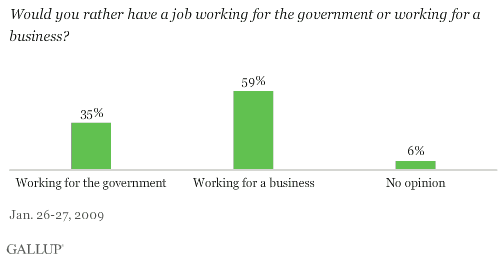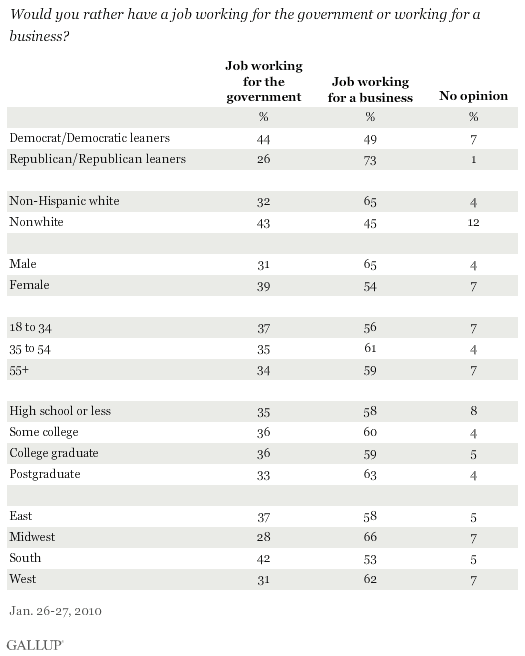PRINCETON, NJ -- Given the choice, more than a third of Americans (35%) would rather have a job working for the government, while 59% would rather work for a business.

President Obama acknowledged in his State of the Union address Wednesday that "the true engine of job creation in this country will always be American businesses." Obama did not suggest that government should directly hire more employees, and in fact proposed a freeze on government spending for three years, beginning in 2011. (Even so, at least one analysis suggests that since major segments of the government -- Defense, Homeland Security, and Veterans Affairs, along with Medicare, Medicaid, and Social Security -- are exempt from the freeze, the government may continue to hire.)
Still, the fact remains that a not-insubstantial segment of American society would find the government to be the most appealing place to work if new jobs are to be created. The 35% of Americans who would prefer to work for the government can be contrasted with the 17% of adult workers whom Gallup estimates actually did work for a state, local, or federal government in 2009. The results of the question about preference for a government versus a business job are based on Gallup interviews with 972 Americans conducted Jan. 26-27.
There are substantial viewpoint differences on this place-of-work choice across segments of the American population.

-
Supporters of Obama's own party are more likely than Republicans to prefer the government over private business as an employer.
-
Whites prefer business over government by a 2-to-1 margin; nonwhites roughly break even in their preferences for the two types of employment.
-
Women are more likely to want to work for the government than are men, though majorities of both prefer working for a business.
-
There are only minor differences across age groups in preference for government versus business employment.
-
Similarly, there are only slight differences across educational categories.
-
Preferences for government employment are higher in the South and East, and lower in the Midwest and in the West.
Gallup has not asked this question in the past. It is possible that interest in a government job is higher now than it would be in nonrecessionary times with lower overall unemployment rates. Government jobs may also look more attractive at this point, given their perceived "safeness" and their typically generous benefits -- particularly at a time when there has been considerable focus on the lack of adequate healthcare coverage in many private businesses.
In addition, news reports over the last year or two have documented the continuing workforce growth of government at the federal level. It may well be that the perceived attractiveness of a private-sector job will rise as the economy picks back up.
As President Obama noted, business remains the true engine of job growth within the U.S., and the fact that fewer than one out of five employees now work for the government means that the substantial majority of jobs in the U.S. remain in the private sector. It is reasonable to assume that the future growth of the U.S. economy will depend on attracting the best and the brightest to America's private business sector. Thus, it is unclear what the impact on this assumption will be if increasing numbers of Americans attempt to avoid business in lieu of a government job.
On Feb. 23, 2010, at its world headquarters in Washington, D.C., Gallup for the first time will release the findings from its daily U.S. employment tracking, including insights into the U.S. workforce's state of mind. Learn more ...
Survey Methods
Results are based on telephone interviews with 972 national adults, aged 18 and older, conducted Jan. 26-27, 2010, as part of Gallup Daily tracking. For results based on the total sample of national adults, one can say with 95% confidence that the maximum margin of sampling error is ±4 percentage points.
Interviews are conducted with respondents on land-line telephones and cellular phones.
In addition to sampling error, question wording and practical difficulties in conducting surveys can introduce error or bias into the findings of public opinion polls.
